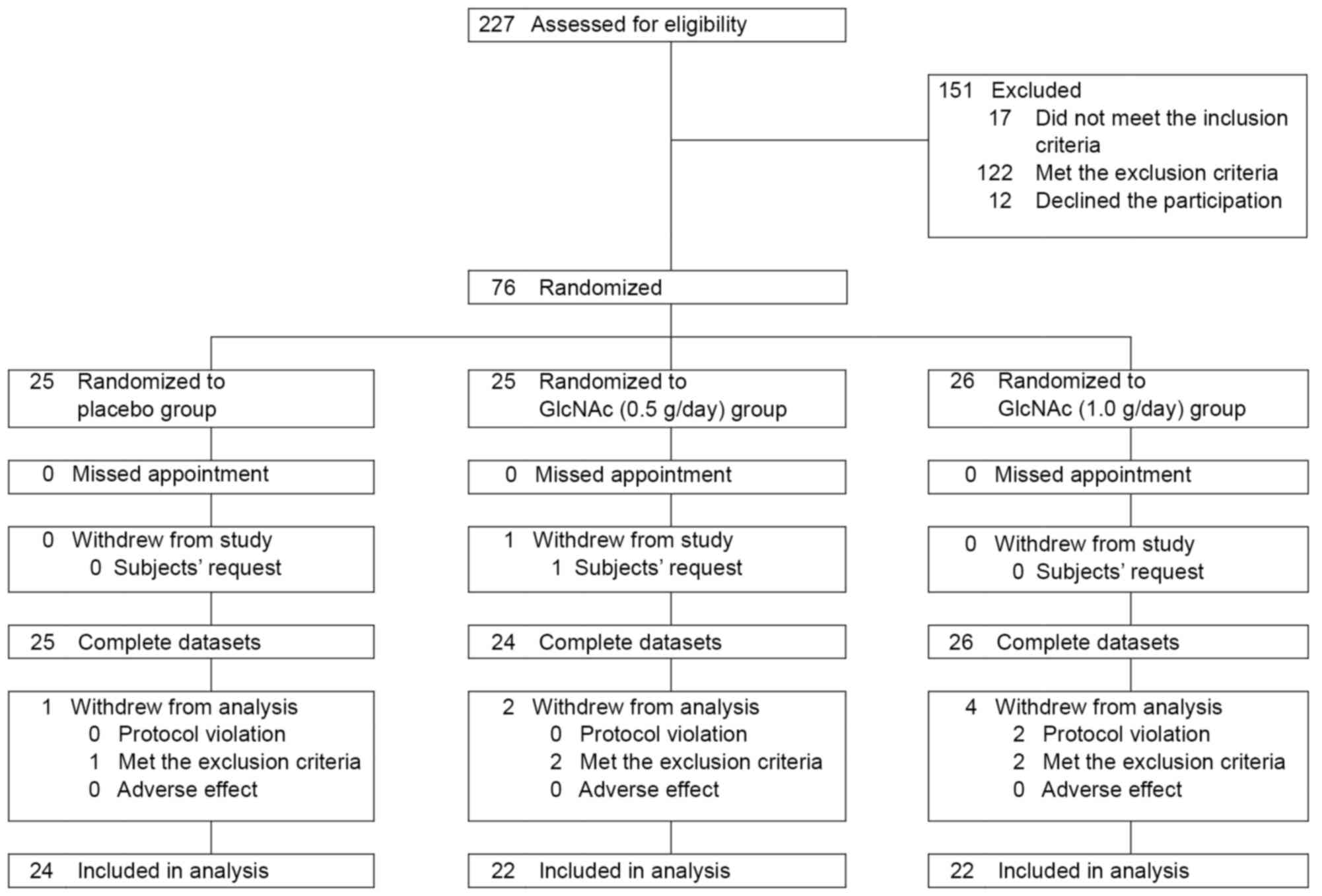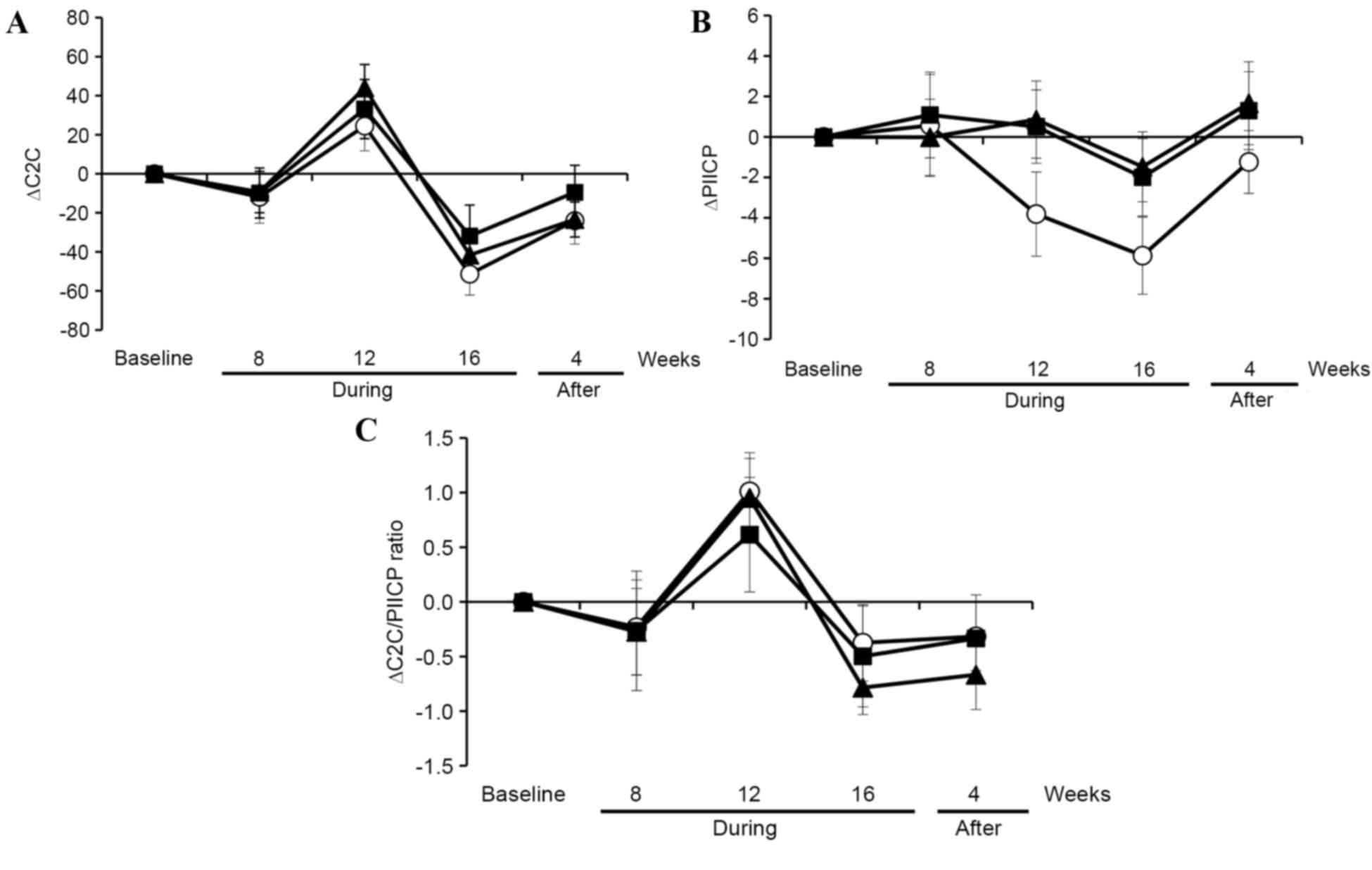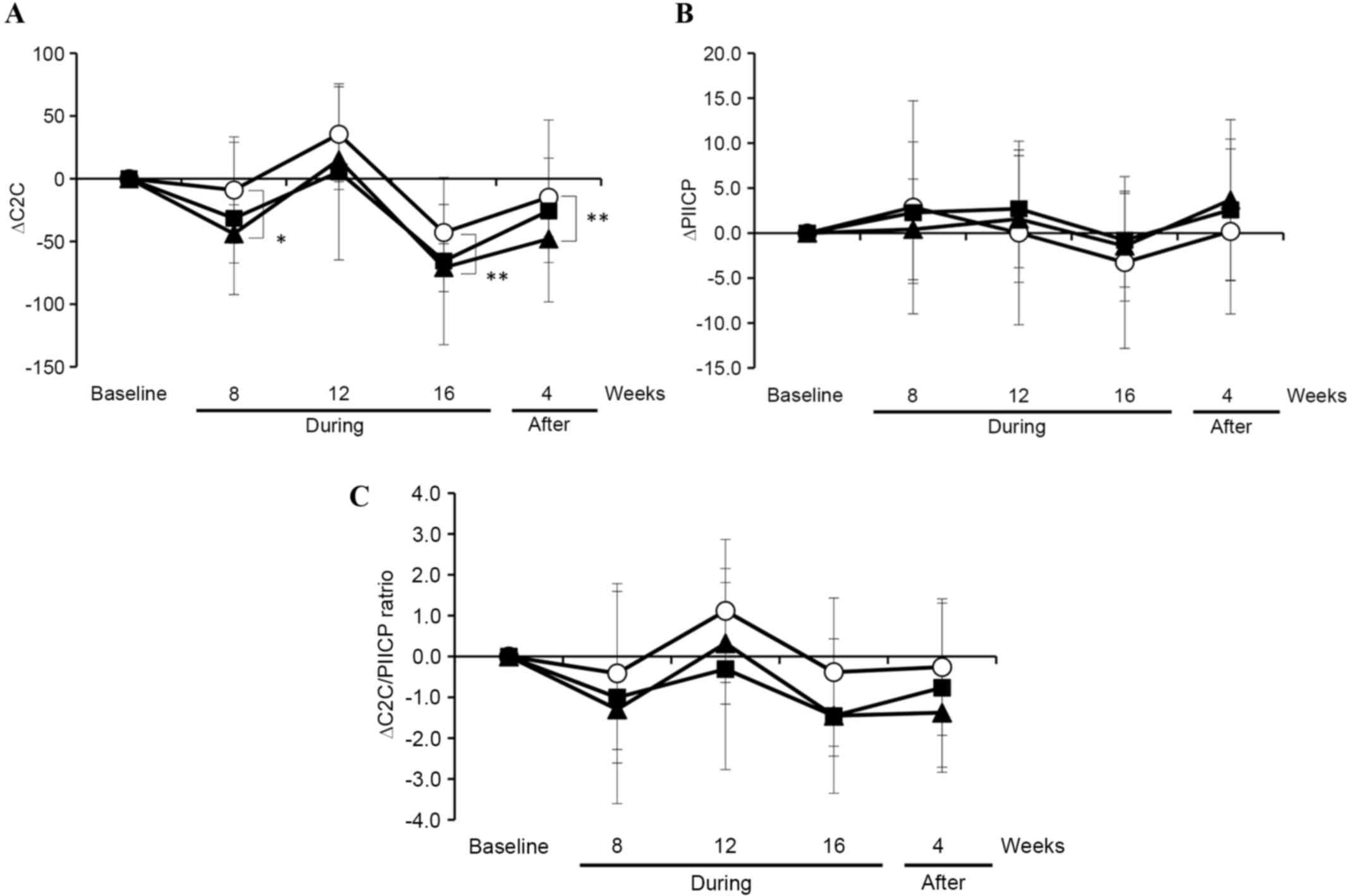|
1
|
Rabenda V, Manette C, Lemmens R, Mariani
AM, Struvay N and Reginster JY: Prevalence and impact of
osteoarthritis and osteoporosis on health-related quality of life
among active subjects. Aging Clin Exp Res. 19:55–60. 2007.
View Article : Google Scholar : PubMed/NCBI
|
|
2
|
Yoshimura N, Muraki S, Oka H, Mabuchi A,
En-Yo Y, Yoshida M, Saika A, Yoshida H, Suzuki T, Yamamoto S, et
al: Prevalence of knee osteoarthritis, lumbar spondylosis, and
osteoporosis in Japanese men and women: The research on
osteoarthritis/osteoporosis against disability study. J Bone Miner
Metab. 27:620–628. 2009. View Article : Google Scholar : PubMed/NCBI
|
|
3
|
Nakasone Y, Watabe K, Watanabe K, Tomonaga
A, Nagaoka I, Yamamoto T and Yamaguchi H: Effect of a
glucosamine-based combination supplement containing chondroitin
sulfate and antioxidant micronutrients in subjects with symptomatic
knee osteoarthritis: A pilot study. Exp Ther Med. 2:893–899.
2011.PubMed/NCBI
|
|
4
|
Wieland HA, Michaelis M, Kirschbaum BJ and
Rudolphi KA: Osteoarthritis-an untreatable disease? Nat Rev Drug
Discov. 4:331–344. 2005. View
Article : Google Scholar : PubMed/NCBI
|
|
5
|
Rashad S, Revell P, Hemingway A, Low F,
Rainsford K and Walker F: Effect of non-steroidal anti-inflammatory
drugs on the course of osteoarthritis. Lancet. 2:11491989.
View Article : Google Scholar : PubMed/NCBI
|
|
6
|
Adams ME, Lussier AJ and Peyron JG: A
risk-benefit assessment of injections of hyaluronan and its
derivatives in the treatment of osteoarthritis of the knee. Drug
Saf. 23:115–130. 2000. View Article : Google Scholar : PubMed/NCBI
|
|
7
|
Anderson JW, Nicolosi RJ and Borzelleca
JF: Glucosamine effects in humans: A review of effects on glucose
metabolism, side effects, safety considerations and efficacy. Food
Chem Toxicol. 43:187–201. 2005. View Article : Google Scholar : PubMed/NCBI
|
|
8
|
Chen JK, Shen CR and Liu CL:
N-acetylglucosamine: Production and applications. Mar Drugs.
8:2493–2516. 2010. View Article : Google Scholar : PubMed/NCBI
|
|
9
|
Igarashi M, Kaga I, Takamori Y, Sakamoto
K, Miyazawa K and Nagaoka I: Effects of glucosamine derivatives and
uronic acids on the production of glycosaminoglycans by human
synovial cells and chondrocytes. Int J Mol Med. 27:821–827.
2011.PubMed/NCBI
|
|
10
|
Longas MO, Russell CS and He XY: Evidence
for structural changes in dermatan sulfate and hyaluronic acid with
aging. Carbohydr Res. 159:127–136. 1987. View Article : Google Scholar : PubMed/NCBI
|
|
11
|
Shuster S, Black MM and McVitie E: The
influence of age and sex on skin thickness, skin collagen and
density. Br J Dermatol. 93:639–643. 1975. View Article : Google Scholar : PubMed/NCBI
|
|
12
|
Reginster JY, Deroisy R, Rovati LC, Lee
RL, Lejeune E, Bruyere O, Giacovelli G, Henrotin Y, Dacre JE and
Gossett C: Long-term effects of glucosamine sulphate on
osteoarthritis progression: A randomised, placebo-controlled
clinical trial. Lancet. 357:251–256. 2001. View Article : Google Scholar : PubMed/NCBI
|
|
13
|
Herrero-Beaumont G, Ivorra JA, Del Carmen,
Trabado M, Blanco FJ, Benito P, Martín-Mola E, Paulino J, Marenco
JL, Porto A, Laffon A, et al: Glucosamine sulfate in the treatment
of knee osteoarthritis symptoms: A randomized, double-blind,
placebo-controlled study using acetaminophen as a side comparator.
Arthritis Rheum. 56:555–567. 2007. View Article : Google Scholar : PubMed/NCBI
|
|
14
|
Wandel S, Jüni P, Tendal B, Nüesch E,
Villiger PM, Welton NJ, Reichenbach S and Trelle S: Effects of
glucosamine, chondroitin, or placebo in patients with
osteoarthritis of hip or knee: Network meta-analysis. BMJ.
341:c46752010. View Article : Google Scholar : PubMed/NCBI
|
|
15
|
Hatano K, Hayashida K, Nakagawa S and
Miyakuni Y: Effects and safety of soymilk beverage containing
N-acetyl glucosamine on osteoarthritis. Jpn Pharmacol Ther.
34:149–165. 2006.
|
|
16
|
Qi C and Changlin H: Effects of moving
training on histology and biomarkers levels of articular cartilage.
J Surg Res. 135:352–363. 2006. View Article : Google Scholar : PubMed/NCBI
|
|
17
|
King KB, Lindsey CT, Dunn TC, Ries MD,
Steinbach LS and Majumdar S: A study of the relationship between
molecular biomarkers of joint degeneration and the magnetic
resonance-measured characteristics of cartilage in 16 symptomatic
knees. Magn Reson Imaging. 22:1117–1123. 2004. View Article : Google Scholar : PubMed/NCBI
|
|
18
|
Cibere J, Zhang H, Garnero P, Poole AR,
Lobanok T, Saxne T, Kraus VB, Way A, Thorne A, Wong H, et al:
Association of biomarkers with pre-radiographically defined and
radiographically defined knee osteoarthritis in a population-based
study. Arthritis Rheum. 60:1372–1380. 2009. View Article : Google Scholar : PubMed/NCBI
|
|
19
|
Kellgren JH and Lawrence JS: Radiological
assessment of osteo-arthrosis. Ann Rheum Dis. 16:494–502. 1957.
View Article : Google Scholar : PubMed/NCBI
|
|
20
|
Holm S: A simple sequentially rejective
multiple test procedure. Scand J Stat. 6:65–70. 1979.
|
|
21
|
Kajimoto O, Matahira Y, Kikuchi K,
Sakamoto A, Kajiya Y and Hirata H: Effects of milk containing
N-acetylglucosamine on osteoarthritis. J New Remedies Clin.
49:301–312. 2000.
|
|
22
|
Katsuno S, Sato K, Eguchi C, Yoshimura K,
Yamamoto T, Tomonaga A and Nagaoka I: Effects and safety of milk
beverage containing N-acetyl glucosamine on knee joint pain and
biomarkers of type II collagen metabolism. Jpn Pharmacol Ther.
38:435–445. 2010.
|
|
23
|
Yokoi K and Fujimoto Y: Effect of dietary
supplement containing N-acetylglucosamine on osteoarthritic pain
and collagen biomarkers. J New Remedies Clin. 62:1758–1768.
2013.
|
|
24
|
Shoji A, Iga T, Inagaki S, Kobayashi K,
Matahira Y and Sakai K: Metabolic disposition of
[14C]N-acetyglucosamine in rats. Chitin Chitosan Res. 5:34–42.
1999.
|
|
25
|
Tamai Y, Miyatake K, Okamoto Y, Takamori
Y, Sakamoto K and Minami S: Enhanced healing of cartilaginous
injuries by N-acetyl-d-glucosamine and glucuronic acid. Carbohydr
Polym. 54:251–262. 2003. View Article : Google Scholar
|
|
26
|
Shikhman AR, Brinson DC, Valbracht J and
Lotz MK: Differential metabolic effects of glucosamine and
N-acetylglucosamine in human articular chondrocytes. Osteoarthritis
Cartilage. 17:1022–1028. 2009. View Article : Google Scholar : PubMed/NCBI
|
|
27
|
Julovi SM, Ito H, Nishitani K, Jackson CJ
and Nakamura T: Hyaluronan inhibits matrix metalloproteinase-13 in
human arthritic chondrocytes via CD44 and P38. J Orthop Res.
29:258–264. 2011. View Article : Google Scholar : PubMed/NCBI
|
|
28
|
Yatabe T, Mochizuki S, Takizawa M,
Chijiiwa M, Okada A, Kimura T, Fujita Y, Matsumoto H, Toyama Y and
Okada Y: Hyaluronan inhibits expression of ADAMTS4 (aggrecanase-1)
in human osteoarthritic chondrocytes. Ann Rheum Dis. 68:1051–1058.
2009. View Article : Google Scholar : PubMed/NCBI
|
|
29
|
Shikhman AR, Kuhn K, Alaaeddine N and Lotz
M: N-acetylglucosamine prevents IL-1 beta-mediated activation of
human chondrocytes. J Immunol. 166:5155–5160. 2001. View Article : Google Scholar : PubMed/NCBI
|
|
30
|
Takahashi M, Inoue K, Yoshida M, Morikawa
T, Shibutani M and Nishikawa A: Lack of chronic toxicity or
carcinogenicity of dietary N-acetylglucosamine in F344 rats. Food
Chem Toxicol. 47:462–471. 2009. View Article : Google Scholar : PubMed/NCBI
|
|
31
|
Miwa I, Mita Y, Murata T, Okuda J, Sugiura
M, Hamada Y and Chiba T: Utility of
3-O-methyl-N-acetyl-D-glucosamine, an N-acetylglucosamine kinase
inhibitor, for accurate assay of glucokinase in pancreatic islets
and liver. Enzyme Protein. 48:135–142. 1994.PubMed/NCBI
|
|
32
|
Kongtharvonskul J, Anothaisintawee T,
McEvoy M, Attia J, Woratanarat P and Thakkinstian A: Efficacy and
safety of glucosamine, diacerein, and NSAIDs in osteoarthritis
knee: A systematic review and network meta-analysis. Eur J Med Res.
20:242015. View Article : Google Scholar : PubMed/NCBI
|

















